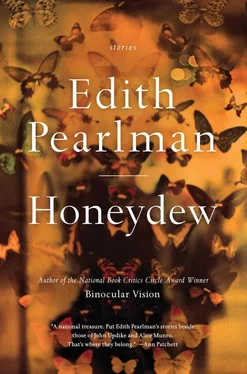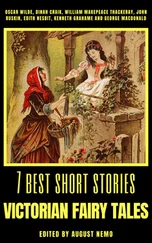The company flourished, and Pansy’s return on her investment was substantial. She was proud of the men’s success. Still, when Marcus and David entered their laboratory day after day, she liked to imagine that, in addition to their other products, they were working on a superinvention that would grant Lyle’s vision to everyone. Performance-enhancing, you might say. When perfected, it would encounter regulations; when produced, it would inspire inferior imitations. Even so, it would be a vehicle for public good.
But after four years it had not yet appeared. So one day the patient Pansy inquired.
“I don’t think we can do it,” Marcus admitted. “We’ve tried; it was one of our original purposes. But we cannot duplicate work that nature took millions of years to accomplish. We cannot invent an external instrument which will produce an internal variant. The butterfly has a genome, the pigeon too. But where does the pentachromatic gene lurk? We cannot tell. And if we could tell, and could extract it, and could transfer it to a human cell, would the cell survive? And if yes, yes, yes, yes…for what purpose? To give people headaches?”
“It would be only a carnival attraction,” Pansy slowly acknowledged. “A rich man’s plaything. But oh, Marcus. No one else can ever become like Lyle. He’s stuck being unique.”
IV.
And what of the unique Lyle during these years? Well, he had things to occupy him: school, cello, baseball, walks at night with Marcus or David or Pansy. Music was blessedly colorless. When he stood in center field, the sky showed him its myriad blues and the field its hundreds of greens, but none of that distracted him from the flight of the sphere, a headless wingless bird, a ball white and off-white and off-off-white. Nothing distracted him from the task of predicting the bird’s destination and putting himself beneath it, mitt at the ready.
He played in the school orchestra. Once in a while he went to a party and talked to whoever seemed left out — talked awkwardly but soothingly, or maybe soothingly because awkwardly.
He thought about someday becoming a doctor. He liked looking at anatomy plates, vivid to begin with, garish under his inspection. He wondered whether his vision, trained, might develop an X-ray component. Marcus doubted it. They discussed diseases of organs other than the eye — diagnosis, treatment, treatment failure.
But despite the error-free fielding record and despite the mild friendships with his peers and despite the comfort of nocturnal darkness in the company of one of the three people he loved, Lyle, heavy with his secret, often felt sorrowfully alone.
When he was sixteen, he began to spend Sunday mornings with last year’s biology teacher. They drove to a nature preserve and then hiked its trails. And then one Sunday, during a forbidding rainstorm, she invited him to forget nature for a day. She was forty, the ideal age to relieve a sensitive boy of his virginity and satisfy his curiosity too. He noted that her areolae were not sepia, as novels said, but pulsing pink rose mauve…This dear woman would be fired without a hearing if her generosity became known — he knew that, and he realized how uncalibrated were the rules that claim to protect us from one another. But Lyle was used to keeping things to himself, and anyway he would never betray Ms. Lapidus. Their Sunday-morning explorations continued — in the nature preserve if the day was bright, in bed if otherwise.
He shared his secret with her — she would not betray him either.
“But, wow!” she said, turning to look at him, her head on her palm, her elbow on the mattress.
“Wow? It’s an affliction.”
“Really? By me it’s an opportunity. Think of the things you could do with those special eyes. Detect art forgeries.”
He blinked at her.
“You could tell the difference between Rembrandt’s paint and pseudo-Rembrandt’s paint,” she explained. And on another occasion she said, “You could identify altered substances. Traces of banned pesticides.”
“Or find the fault lines in a rock,” he unenthusiastically contributed.
“Or see a smear of makeup on a man’s tweed shoulder.”
“Huh?”
She told him that adulterers usually tried to keep their activities hidden, and that their wronged spouses often hired detectives for a substantial fee. And on yet another rainy Sunday she suggested that he could identify fish misnamed by dishonest restaurants. “And sometimes they serve brains masquerading as sweetbreads, or maybe it’s the other way around. You could bring miscreants to court.”
He didn’t answer. He was again looking at her breasts. The areolae were mauve, yes, but mostly by contrast to what he now noticed as yellowish skin; and when he raised his eyes he saw that her sclera were curdling. To foresee the coming of disaster — that was not how he wanted to use his gift.
“Would you do something for me?” he managed.
“Just about anything,” she confessed.
“Would you have your doctor do an MRI of your abdomen?”
“What? I feel fine.”
“And a pancreas biopsy,” he said, and began to cry.
V.
Another year. And then, one August afternoon, Marcus emerged from the lab and found Lyle practicing hoop shots by himself.
“I have a story to tell you,” Marcus said.
“Okay.” When Lyle read, the black letters sometimes shuddered on the page. But when he listened, his closed eyes found a sort of repose behind the patchwork cerise of his lids.
“It’s a Jamaican tale,” Marcus said.
“Oh, then about Anansi.”
“Anansi plays a part. But it’s about a young man.”
They sat on the ground, their arms around their knees and their backs against the trunk of a beech, as if they were in a Caribbean village leaning against a guango.
Marcus began:
“Once upon a time there lived a youth who was never happy unless he was prying into things other people knew nothing about. Especially things that happened at night. He wanted secrets to be laid bare to him. He wandered from wizard to wizard, begging each of them in vain to open his eyes, but he found none to help him. Finally he reached Anansi. After listening to the youth, the spider warned:
“‘My son, most discoveries bring not happiness but misery. Much is properly hidden from the eyes of men. Too much knowledge kills joy. Therefore think well what you are doing, or someday you will repent. But if you will not take my advice, I can show you the secrets you crave.’
“‘Please!’
“‘Tomorrow night you must go to the place where, once in seven years, the serpent-king summons his court. I will tell you where it is. But remember what I say: blindness is man’s highest good.’
“That night the young man set out for the wide, lonely moor belonging to the serpent-king. He saw a multitude of small hillocks motionless under the moonlight. He crouched behind a bush. Suddenly a luminous glow arose in the middle of the moor. At the same moment all the hillocks began to squirm and to crawl, and from each one came thousands of serpents making straight for the glow. The youth saw a multitude of snakes, big and little and of every color, gathering together in one great cluster around a huge serpent. Light and colors sprang from its head. The young man saw brilliance usually denied to mortal eyes. He saw iridescence, bioluminescence, adularescence, opalescence. Then the scene vanished. He went home.
“The next day he counted the minutes till night, when he might return to the forest. But when he reached the special place, he found an empty moor: gray, gray, and gray. He went back many nights but did not see the colors. He would have to wait another seven years.
Читать дальше












